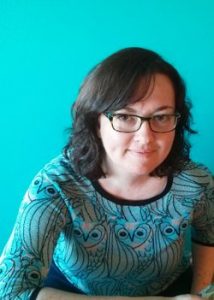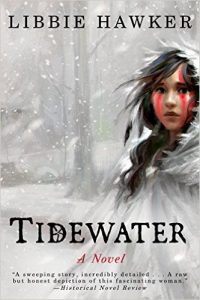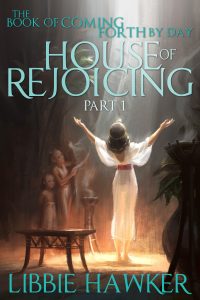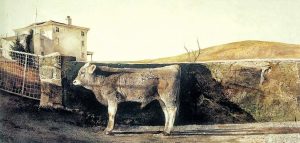 I’m delighted that my guest today on Triclinium is Libbie Hawker who writes historical and literary fiction featuring complex characters and rich details of time and place. She lives in the beautiful San Juan Islands with her husband and two naughty cats.
I’m delighted that my guest today on Triclinium is Libbie Hawker who writes historical and literary fiction featuring complex characters and rich details of time and place. She lives in the beautiful San Juan Islands with her husband and two naughty cats.
Libbie is also an idol of mine. She is the author of dozens of books, the majority of which are self published, but she also partners with Lake Union Publishing on select titles. Libbie is proof that talent, hard work and smarts can equal success. And she loves the ancient world – particularly Egypt. She’s my kind of gal! You can connect with Libbie via Facebook or her website.
What or who inspired you to first write? Which authors have influenced you?
When I was a little kid, rabbits were my favorite animal, so my dad showed me the animated movie Watership Down. Some of your readers are probably horrified by that, since the film is notoriously violent, and many people have claimed that it traumatized them as children. However, even though I couldn’t have been more than four or five years old the first time I saw it, I absolutely fell in love with the story and the characters. I couldn’t get enough of Watership Down, and by the time I was eight, I was reading the book that inspired the “traumatizing” movie over and over again. The fact that it was written for an adult audience and is hundreds of pages long didn’t faze me in the least. My family and I lost track of how many times I re-read it, but by the time I graduated from high school, the tally was somewhere in the high 20s. I kept trying out other books, but very few of them inspired me or captivated me the way Watership Down did, so I always went back to it. Sometime early my Watership Down phase, before I was in third grade, I realized that Richard Adams must have been paid to write that book, or at least he was getting paid every time somebody bought a copy. I had found my future vocation: I was going to write fiction. My mind never changed, from that point on. I knew I wanted a career as a novelist.
 I still love Watership Down—I’ve got a tattoo of one of the characters, and I named my business, Running Rabbit Press, after the embossed image on the front of my first copy of that book. And I’m inordinately stoked about the BBC remake of the animated film, which is coming out next year. But as I got older, I found many other inspiring authors who have influenced me. Vladimir Nabokov, L. M. Montgomery, Hilary Mantel, Joyce Carol Oates, George R. R. Martin, and Michael Ondaatje are some of my top inspirations, and I find newer authors to give me a kick in the pants all the time, such as Natalee Caple and Emma Cline. I also get a lot of writing inspiration from great song lyrics. Leonard Cohen and Neko Case have had a lot of influence on my writing career.
I still love Watership Down—I’ve got a tattoo of one of the characters, and I named my business, Running Rabbit Press, after the embossed image on the front of my first copy of that book. And I’m inordinately stoked about the BBC remake of the animated film, which is coming out next year. But as I got older, I found many other inspiring authors who have influenced me. Vladimir Nabokov, L. M. Montgomery, Hilary Mantel, Joyce Carol Oates, George R. R. Martin, and Michael Ondaatje are some of my top inspirations, and I find newer authors to give me a kick in the pants all the time, such as Natalee Caple and Emma Cline. I also get a lot of writing inspiration from great song lyrics. Leonard Cohen and Neko Case have had a lot of influence on my writing career.
What is the inspiration for your current book? Is there a particular theme you wished to explore?
I sort of have two halves to my writing career. I’m always working on a commercial project (Monday through Wednesday), which I expect to actually earn some money, and a literary project (Thursday and Friday), which I don’t expect to turn a profit. The literary stuff is what I love the most, and it’s what I feel I do best, but it’s damn near impossible to build a career on lit. So I keep a constant flow of historical fiction, which has enough broadly appealing features that I’ve been able to find a wide audience for it and keep a roof over my head with its sales.

So right now, as always, I’m working on two books. The first, Persian Rose, is a follow-up to my newest release. It’s set in 25th-dynasty Egypt, and is a bit of a political thriller in ancient times, which is a fun new departure for me. There was no particular theme to it, other than the fact that I just found the story fun and exciting. The majority of my readers like my Egyptian fiction best, so I try to give them a good Egyptian novel at regular intervals.
The second is a literary novel I’ve been pecking away at for months now. Calamity is part historical novel, part ghost story, and it’s about the life of Calamity Jane. In her story, which was dominated by addition and loss, I found some interesting parallels to my father’s life, so writing about Calamity has actually given me the chance to write about my dad at the same time.
What period of history particularly inspires or interests you? Why?
I find so many parts of history intriguing, and I gladly write historical fiction in almost any setting, when I find a story I like. But the ancient world really captivates my imagination the most. As for why… I don’t really know! Maybe it’s because the world was so different back then, it almost feels like a fantasy setting. Or maybe it’s just fun to explore the ways human behaviour seems to remain constant, even when thousands of years and major jumps in technology separate us.
What resources do you use to research your book? How long did it take to finish the novel?
 For the series I’m in the middle of now (the White Lotus trilogy, which includes Persian Rose, mentioned above), I’ve done so much research on ancient Egypt in the past that I find I need to do very little intensive reading to write a good Egyptian historical novel. I’ve got a lot of Egypt stuff crammed in my head now. But I have bookmarked a few interesting scholarly papers and a few articles from Kmt magazine (the journal of Egyptology) that touch on the specific years over which this series takes place, and some of the real historical figures who play roles in the narrative.
For the series I’m in the middle of now (the White Lotus trilogy, which includes Persian Rose, mentioned above), I’ve done so much research on ancient Egypt in the past that I find I need to do very little intensive reading to write a good Egyptian historical novel. I’ve got a lot of Egypt stuff crammed in my head now. But I have bookmarked a few interesting scholarly papers and a few articles from Kmt magazine (the journal of Egyptology) that touch on the specific years over which this series takes place, and some of the real historical figures who play roles in the narrative.
Currently, it takes me about four to six weeks to finish a book, depending on its length. I write full-time, and I get about 5000 to 6000 words done per day.
What do you do if stuck for a word or a phrase?
I often get stuck for whole scenes! I’ve learned that I can lose entire days of work time just sitting there, staring at the blank screen in frustration while I search for the perfect word or phrase or scene. So now, when I feel myself getting stuck, I power through whatever’s sticking me by putting the text in [brackets.] My rule is: anything within the brackets sucks, and that’s totally fine. If it’s inside brackets, I don’t need to make it any good at all this time around. I can write total garbage, or be as vague as I want to be, or use a linguistic style that doesn’t belong in this book (modern slang, etc.) as long as I get the general idea out of me and move on.
Later, when I do my own edits (before passing the book along to its official editor), I run a find/replace search for brackets and I polish up whatever is inside of them, and of course I delete the brackets themselves. I have had books where literally 50% of the text was inside brackets at the end of my first draft! When I get stuck like that, I have to just accept the bracketed stuff as a sketch or an underpainting for a work of visual art. It’s not the finished product; it’s not what the reader will actually see. So it’s okay to keep it loose and weird and barely-formed. It’s just there to help me create the finished product; it’s not the finished product, itself.

Is there anything unusual or even quirky that you would like to share about your writing?
I need silence while I write. I’m hyper-sensitive to sounds, which can make everyday life miserable enough sometimes, but my sensitivity gets cranked up to eleven while I’m writing. White noise is just fine, like freeway sounds or crickets or the little tree frogs we get here in the spring and fall. But anything with a rhythm to it, like music—or worse, the sound of people talking—drives me crazy while I’m trying to write. We moved from a big city to the most isolated community we could find, on an island an hour’s boat ride away from the mainland, in search of consistent quiet so I could write more productively. And even here, it’s not always quiet enough for me, so if there’s the least trace of invasive sound, I put on my Bose noise-cancelling headphones while I’m working. I couldn’t get by without those headphones.
Do you use a program like Scrivener to create your novel? Do you ever write in long hand?
I’ve tried to use Scrivener, but I just don’t like it. It has so many bells and whistles that other authors really enjoy and find useful, but I never used at all, so I went back to plain old boring Word.
I do journal in longhand, but I don’t write my books that way. Usually, by the time I know a story well enough inside my head to actually turn it into a book, my thoughts are flying so fast that my quicker-than-average typing speed can’t even keep up, so I’d probably find longhand novel-writing very frustrating.
Is there a particular photo or piece of art that strikes a chord with you? Why?
 There are many! My dad (who has been mentioned a surprising number of times in this interview!) and my grandfather were both professional artists, so I grew up surrounded by visual art. I feel very lucky in that regard; I think art is more important to us as a species than most of us realize. But I feel most drawn to classic Impressionism, especially regionalist and tonalist styles.
There are many! My dad (who has been mentioned a surprising number of times in this interview!) and my grandfather were both professional artists, so I grew up surrounded by visual art. I feel very lucky in that regard; I think art is more important to us as a species than most of us realize. But I feel most drawn to classic Impressionism, especially regionalist and tonalist styles.
I have a really powerful connection to the Wyeth family’s art, particularly N.C.’s tonalist illustrations, Jamie’s haunting portraits, and just about everything Andrew ever did. Their incredibly emotional, earthy, rather dreary work always puts me in exactly the right mood for writing my literary stuff.
If I had to pick one favorite, I’d say it’s Andrew Wyeth’s Young Bull.
What advice would you give an aspiring author?
Finishing the first book is always the hardest thing. It seems impossible; for some people, it takes years to do it. But once you get to “The End” with your first novel, you suddenly realize it wasn’t as hard as you thought it was while you were doing it. So keep working steadily until you get to the end. The next books will come faster and easier, I promise.
And use that bracket trick. It’s a life-saver.
Tell us about your next book.
My most recent release is White Lotus (December 23, 2016.) It’s the first in a trilogy, about a Greek slave who finds herself caught in a treacherous political game in Egypt. She is forced to become a double agent just to survive, but in the end, she gets to decide the fate of the most powerful empire on the planet, so karma gets the last laugh.

In the fifth century BCE, Egypt is the greatest civilization known to mankind. But with a foolish king on its throne, the Nile Valley is ripe for conquering.
Amid this climate of danger and strife, in the alleys and brothels of Memphis, an extraordinary young woman comes of age. To spare her siblings from starvation, Doricha is sold into prostitution. But she has gifts beyond mere beauty. Through wit and determination, she works her way into the realm of the hetaerae—courtesans of exceptional refinement.
As a hetaera, Doricha has access to the schemes and negotiations that shape the world. But the rich and powerful also have access to her, and Doricha soon finds herself in the Pharaoh’s harem, caught up in his reckless plot. When the Pharaoh sends her off to his fiercest enemy, thinly cloaked by a dangerous ruse, Doricha must become a double agent if she hopes to survive. Caught between the Pharaoh and the Persian king Cambyses, it is Doricha—once a slave, now a woman of great but secret power—who will determine Egypt’s fate.
Blending ancient fable with true history, White Lotus brings Egypt’s downfall to life.
You’ll find a complete list of Libbie’s books on her Amazon page. In particular, you might like to check out The Sekhmet Bed, the first book in her She-King series, or House of Rejoicing, Part 1 in the Book of Coming Forth By Day. Her standalone, Tidewater, might also take your fancy. It’s a retelling of the tale of Pocahontas. And don’t forget to grab a copy of White Lotus!
Libbie, thanks so much for dropping by Triclinium to share insights into your inspiration and writing processes. Love your [bracket] trick:) Good luck with Calamity.



I hope this is where I can leave a post about Libbie Hawker’s interview and hopefully win a CD copy of , Call to Juno!
I have never had the opportunity to read any of Libbie’s books but since I have loved the lures of Egypt since I was a young child I now find that she is now a must read for me.
I found it so interesting to read how she uses [brackets] to help her to come back and polish up a phrase/sentence when she gets stuck while writing her books. Since I’m not a writer I never would have thought of that. I would probably use up so much time in trying to come up with the right wording. It would take me months or longer to just write a few chapters. So I leave the writing to those such as you, Elisabeth and Libbie and enjoy the fruits of your labor.
I now plan to buy the White Lotus the first of Libbie’s Trilogy on Ancient Egypt and Doricha to see how she becomes a double agent to save her life.
Thank you Elisabeth for your beautifully written books that have truly transferred me to many hours of reading pleasure.
I really enjoyed learning more about Libbie and her books. The new trilogy sounds fascinating! And moving to an isolated island so she could write – that I totally understand. My husband and I live out in the county for the relative privacy – not too far from town but far enough from the city and neighbors. Great interview. Thanks for introducing us to a new author!
Thanks for dropping by Patrician and CG. I’m sure you’ll enjoy Libbie’s books. And Patricia – thanks for your kind words about my series.
Best
Elisabeth
Libbie’s productivity is amazing. I’m drooling with envy!! Congratulations on your latest release.
Great interview! I am always on the lookout for books set in Ancient Egypt. It looks like I have a few more books to add to my TBR list.
I have had Libbie’s books on my TBR list for a while now but have kept pushing them down farther in the pile. After reading your interview, I have elevated them closer to the top! I think I will start with Tidewater. Love the cover for White Lotus!
I am so adopting the bracket trick!
So am I!
Wow, thank you for all the kind responses! I hope you all enjoy my books if you do check them out.
Terry, I’m so glad you like the cover for White Lotus! I made it myself. (In a “previous life,” before I was writing full-time, I used Photoshop a lot for professional projects, so I feel fortunate that I’ve got enough basic graphics skills to whip up a cover now and then when I need to. It saves me some money, since I write so dang many books and the cost of good covers can really add up!)
I’ve never read of these books but I’d love to. Sounds like a fascinating time period.
I am captivated and mystified on ancient Egyptian history. They have technology that rivals our own. I even took an audio course on ancient Egyptian history and quickly learn hieroglyphic alphabets so I can try my hand on interrupting some of the Egyptian writing. When I did that, it reminds me of Indiana Jones and the Raiders of the Lost Ark. I would love to experience ancient Egyptian through a story.
The bracket trick is a great idea. I’ll have to try that.
Loved the interview.The books sound intriguing I’m going to try this new to me author.